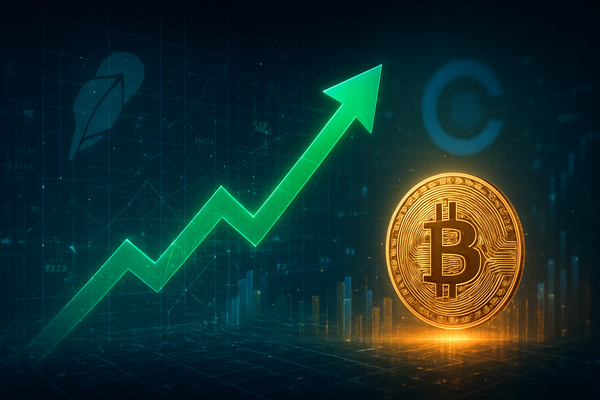From Skepticism to Crypto Kings: The Trump Family's Billion-Dollar Digital Empire

In a stunning reversal of previous sentiment, the Trump family has pivoted from outright skepticism to becoming formidable and financially dominant players in the burgeoning cryptocurrency market. This dramatic shift, spearheaded by former President Donald Trump's newfound pro-crypto political stance and the active involvement of his children in various digital asset ventures, has seen their estimated wealth soar, rapidly accumulating billions and fundamentally altering their financial portfolio. Their aggressive entry into NFTs, meme coins, decentralized finance (DeFi), and Bitcoin mining operations marks a significant moment, not only for the family's legacy but also for the legitimization and political trajectory of the entire digital asset industry.
The family's deep dive into crypto assets signals a profound reorientation of their business interests, moving beyond traditional real estate holdings to embrace the volatile yet lucrative world of blockchain technology. This transformation is not merely a diversification strategy; it appears to be a deliberate and well-executed move to leverage their influential brand and political capital into the rapidly expanding digital economy, setting a precedent for how public figures can intersect with and capitalize on emerging financial technologies.
The Digital Gold Rush: How the Trumps Built a Crypto Fortune
The Trump family's journey into the crypto market is a tale of strategic pivots and rapid wealth accumulation, underpinned by a dramatic shift in Donald Trump's public stance on digital currencies. Once a vocal critic, calling Bitcoin "not money" and "a scam," the former president's perspective began to evolve, particularly during his 2024 presidential campaign, where he embraced a distinctly pro-crypto platform. This shift laid the groundwork for his administration's "forward-thinking approach" to digital assets upon his return to office, aiming to cement the United States as the "crypto capital of the planet."
Central to the family's crypto empire are several key ventures. World Liberty Financial (WLF), a decentralized finance (DeFi) network, was co-founded by Donald Trump Jr., Eric Trump, and Barron Trump, with Donald Trump holding the title of "co-founder emeritus" or "Chief Crypto Advocate." WLF launched its native token, WLFI, in late 2024, with the family's substantial stake (approximately 22.5 billion tokens, nearly a quarter of the total supply) reportedly valued at about $5 billion on paper after its public trading debut in September 2025. This launch, which saw WLFI reach a market capitalization of almost $7 billion, created an immediate and significant paper windfall. A deal with public company Alt5 Sigma (CSE: ALTS) to stockpile WLFI tokens further added an estimated $670 million to the family fortune. WLF also issued a stablecoin, USD1, aiming to become a leader in global decentralized finance.
Another significant venture is American Bitcoin Corp. (ABTC), a crypto mining operation co-founded by Eric Trump, with Donald Trump Jr. also holding a stake. ABTC went public after merging with Gryphon Digital Mining (NASDAQ: ABTC), re-listing under the ABTC ticker. Eric Trump's approximately 7.5% stake in ABTC was valued at over $500 million when trading debuted in September 2025, reportedly approaching $1 billion at its peak. In just a few weeks, the family generated approximately $1.3 billion from their stakes in WLF and ABTC combined.
Beyond these corporate structures, the family has also capitalized on the meme coin phenomenon and Non-Fungible Tokens (NFTs). Donald Trump launched multiple series of "Trump Digital Trading Cards," with financial disclosures indicating he has earned over $7 million from his NFT collections overall. His fourth collection, "Series 4: The America First Collection," released in August 2024, alone generated over $2.17 million. Various meme coins, including $TRUMP (MAGA) and $Melania, are also associated with the family, leveraging their brand recognition for speculative gains in the highly volatile market. The rapid and substantial increase in their wealth, driven "almost entirely" by these crypto investments, has seen their net worth surge to an estimated $7.7 billion, now reportedly eclipsing their traditional real estate holdings. This digital fortune represents an unprecedented accumulation of wealth for the family, highlighting their effective, albeit controversial, embrace of the digital frontier.
Public Winners and Losers in the Trump Crypto Era
The Trump family's pervasive entry into the crypto market, bolstered by a supportive political climate under Donald Trump's presidency, is significantly reshaping the fortunes of public companies within the digital asset space. This "America First" crypto strategy, characterized by policies favoring domestic mining, regulatory clarity, and opposition to Central Bank Digital Currencies (CBDCs), is creating a distinct landscape of winners and losers.
Among the clearest beneficiaries are U.S.-based crypto mining companies. Gryphon Digital Mining (NASDAQ: ABTC), already directly intertwined through its merger with American Bitcoin Corp., has seen a substantial boost in its shares and valuation due to the Trump family's involvement. Other major U.S. miners like Marathon Digital (NASDAQ: MARA), Riot Platforms (NASDAQ: RIOT), and CleanSpark (NASDAQ: CLSK) are also poised for significant gains. Policies encouraging all Bitcoin mining to occur within the United States, coupled with potential energy or tax incentives and reduced regulatory hurdles, directly benefit these domestic operators. Hut 8 Corp. (NASDAQ: HUT), which provided equipment to American Bitcoin Corp., also stands to gain from this heightened activity.
Companies that have strategically integrated Bitcoin into their treasury holdings are also emerging as significant winners. With government legitimization and institutional adoption accelerating, these companies are likely to see increased confidence and potential price appreciation of their digital assets. MicroStrategy (NASDAQ: MSTR), the largest corporate holder of Bitcoin, is a prime example, poised for substantial benefits. Other companies with significant Bitcoin holdings, such as Tesla (NASDAQ: TSLA), Block Inc. (NYSE: SQ), Coinbase (NASDAQ: COIN), and Galaxy Digital (CBOE: GLXY), will also likely capitalize on this environment. The recent adoption of Bitcoin as a treasury reserve by emerging players like GameStop (NYSE: GME) further aligns with this pro-crypto trend.
Crypto exchanges and brokerages like Coinbase (NASDAQ: COIN) could experience increased trading volumes and user adoption as regulatory clarity reduces perceived risks and boosts mainstream acceptance. A potential shift in regulatory power from the SEC to the more industry-friendly CFTC is also viewed as a favorable operating environment for these platforms. Furthermore, the small public company Alt5 Sigma (CSE: ALTS) has already seen its value boosted due to its deal with World Liberty Financial.
Conversely, certain entities may find themselves on the losing side. Companies involved in Central Bank Digital Currency (CBDC) development face a significant headwind, given President Trump's strong opposition to a U.S. CBDC. Any public companies or financial institutions that had invested in or planned to support such initiatives could see those efforts curtailed or canceled. Traditional financial institutions resistant to crypto integration may also face competitive pressure. Banks and payment processors slow to embrace digital assets could lose market share as the financial system increasingly integrates crypto, and new crypto-native services emerge as direct competitors. If regulatory oversight primarily shifts to the CFTC, companies that previously benefited from the SEC's stringent approach (which often limited competition) might face a more crowded and less predictable market. Lastly, while the Trump family's NFTs have been successful, some experts caution that a broader lack of regulatory enforcement could lead to a resurgence of scams in the wider NFT market, potentially eroding investor trust and negatively impacting public companies with significant exposure to or reliance on the less curated NFT space. The intertwining of personal financial stakes with public policy, while generating massive wealth for the Trump family, also introduces potential conflicts of interest and market volatility that could affect associated companies if controversies arise.
Reshaping the Digital Frontier: Industry Impact and Broader Implications
The Trump family's deep immersion into the crypto market, coupled with the administration's pronounced pro-crypto policy shift, is not merely a political spectacle; it's a transformative force reshaping the digital asset landscape. This confluence of personal ambition and political power is aligning with and accelerating several broader industry trends, while also generating significant ripple effects and introducing complex regulatory and ethical considerations.
One of the most significant implications is the accelerated institutional adoption and market maturation of cryptocurrencies. The administration's policies, such as the establishment of a Strategic Bitcoin Reserve and the repeal of anti-crypto regulations, serve to normalize digital assets within institutional portfolios. This governmental endorsement, combined with the successful launch of U.S. spot Bitcoin ETFs, attracts billions in inflows, signaling a growing acceptance among traditional finance players. The Trump family's direct ventures capitalize on and further bolster this trend, making crypto an undeniable part of the mainstream financial dialogue.
The phenomenon of celebrity and brand-backed crypto is also reaching new heights. The success of Trump's meme coins and NFTs vividly illustrates how public figures can leverage their brand equity to create and monetize digital assets, tapping into existing fanbases and media attention for viral marketing. This trend extends beyond the Trumps, encouraging other public figures to explore similar ventures, further integrating digital assets into popular culture and commerce.
The administration's pro-crypto stance is a powerful part of a wider deregulatory push for innovation within the industry. The desire for clearer, less restrictive regulatory frameworks to foster innovation and attract capital has long been a rallying cry for the crypto sector. The shift from an enforcement-heavy approach to one focused on "smart, pro-innovation rules of the road" directly addresses this industry demand, potentially unleashing new waves of development and investment. However, this deregulatory zeal also raises concerns about financial stability and investor protection, particularly in a market historically prone to speculative bubbles and fraudulent schemes.
The policy shift introduces profound regulatory and policy implications that extend beyond simply identifying winners and losers. The administration aims to provide regulatory certainty through initiatives like the SEC's "Crypto 2.0" task force, comprehensive market structure legislation, and the GENIUS Act for stablecoins. This is welcomed by the industry, but the approach, particularly the reclassification of some digital assets, leads to inter-agency dynamics and jurisdictional shifts, potentially diminishing SEC oversight and shifting authority to the CFTC. This redefinition of roles could lead to a more fragmented regulatory landscape and a "tug-of-war" between federal and state overseers. Furthermore, the "America First" crypto strategy, while aiming to establish the U.S. as a global leader, could also create new geopolitical and diplomatic tensions through direct crypto deals with specific countries, such as WLF's reported talks with Pakistan.
Historically, this era draws parallels to the "1933 moment" for capital markets, when the Securities Act established foundational definitions and frameworks for market operation. The Trump administration's efforts to create clear rules for digital assets aim for a similar outcome, fostering long-term stability. Moreover, the increasing correlation between crypto markets and traditional asset classes, coinciding with institutional entry, mirrors how other emerging assets have gradually become intertwined with global financial cycles, subject to similar macroeconomic drivers. Ultimately, the Trump family's deep involvement, combined with a pronounced policy shift, is a significant force reshaping the digital asset landscape, pushing for regulatory clarity, attracting institutional capital, and legitimizing crypto, all while sparking critical debates about conflicts of interest and the future of global financial governance.
The Horizon: What Comes Next for the Trump Crypto Empire
The Trump family's rapidly expanding footprint in the cryptocurrency market signals an exciting yet unpredictable future, closely intertwined with the political and regulatory landscape. Both short-term maneuvers and long-term ambitions suggest continued aggressive expansion, though challenges related to market volatility and ethical scrutiny will remain ever-present.
In the short term, the family's existing ventures are poised to capitalize on the pro-crypto sentiment cultivated by Donald Trump's presidency. The continued growth of World Liberty Financial (WLF) and American Bitcoin Corp. (ABTC) is expected, with Eric Trump predicting "explosive" growth in the cryptocurrency sector over the next 12 to 18 months. Trump Media & Technology Group (NASDAQ: DJT), owner of Truth Social, is also set to diversify further into financial services, including substantial investments in Bitcoin and crypto-related securities, aiming to build a "$2.5 billion Bitcoin treasury." TMTG's partnership with Crypto.com to launch digital asset ETFs and the integration of "Truth gems" into Cronos (NASDAQ: CRO) tokens on Truth Social underscore a strategic move to weave crypto directly into their media ecosystem. Melania Trump's continued involvement in Web3 and NFT initiatives, particularly through her platforms MelaniaTrump.com and USAMemorabilia, indicates a sustained focus on leveraging digital art for branding and philanthropic efforts.
Long-term possibilities point towards an even deeper integration into the blockchain economy. The family is actively exploring real estate tokenization, which involves creating digital proxies for physical properties on the blockchain. This could revolutionize the property industry by enabling fractional ownership and increasing liquidity for traditionally illiquid assets, opening up massive new markets. World Liberty Financial, with Barron Trump reportedly a "DeFi visionary," aims to transform financial services through blockchain technology, expanding its decentralized finance offerings to compete with established protocols. The sustained political influence of the Trump administration is also expected to continue reshaping financial agencies like the SEC, leading to formal rulemaking for regulatory clarity and boosting institutional involvement through more approved crypto investment vehicles.
Strategic pivots and adaptations are already evident. The rapid wealth generation from crypto signals a clear shift away from traditional real estate as the primary asset. The integration of crypto directly into TMTG's platforms demonstrates a move to incorporate digital assets into existing business models. Furthermore, the aggressive pro-crypto stance and lobbying efforts indicate a strategic adaptation to proactively shape the regulatory environment, a crucial factor for the long-term success of their ventures.
However, significant market opportunities and challenges loom. The most apparent opportunity is a potentially favorable regulatory environment under a Trump presidency, reducing hurdles and fostering innovation. Asset tokenization, new revenue streams from NFTs and DeFi, and the acceleration of mainstream adoption present vast growth potential. Conversely, market volatility remains a persistent challenge, with even Trump-associated meme coins experiencing significant price swings. Ethical concerns and regulatory scrutiny stemming from the family's direct financial ties to crypto projects while Donald Trump is president will continue to be a focal point, drawing criticism from lawmakers and ethics watchdogs. Risks of market manipulation due to political endorsements and intense competition within the crypto space are also considerable.
In terms of potential scenarios, a "bullish" outcome would see a highly favorable regulatory framework, leading to stable crypto price increases, successful real estate tokenization, and TMTG's crypto integrations attracting a large user base. A "volatile/mixed" scenario would involve continued market fluctuations despite pro-crypto policies, with ethical concerns and slow policy implementation dampening investor confidence. A "bearish" scenario could arise from regulatory backlashes, a broader market downturn, or increased calls for stricter regulations due to perceived conflicts of interest, significantly challenging their ventures. Ultimately, the Trump family's future in crypto is a dynamic interplay of political will, market forces, and their own entrepreneurial drive, requiring continuous strategic adaptation to navigate this evolving digital frontier.
The Crypto Crown: A New Era of Digital Influence
The Trump family's journey from crypto skeptics to key players marks a watershed moment in the intersection of political influence and emerging financial technology. This comprehensive pivot, driven by a combination of entrepreneurial ambition, a desire to circumvent traditional financial institutions, and a strategic political shift, has not only reconfigured their personal wealth but also undeniably reshaped the landscape and perception of the entire cryptocurrency market. The rapid accumulation of billions through ventures like World Liberty Financial (WLF), American Bitcoin Corp. (ABTC), and various NFT and meme coin initiatives underscores a profound reorientation of the Trump empire towards digital assets.
The administration's pro-crypto stance, characterized by pledges to make the U.S. a "crypto capital," a lighter regulatory touch, and an opposition to CBDCs, has instilled significant investor confidence. This policy environment, coupled with the family's high-profile involvement, has undeniably contributed to the legitimization and accelerated mainstream adoption of digital assets. While proponents hail this as a necessary step towards innovation and financial freedom, critics continue to raise substantial ethical and security concerns, particularly regarding potential conflicts of interest, the blurring of lines between public duty and private gain, and the implications for anti-money laundering measures in international deals. The intertwining of the Trump brand with the volatile crypto market introduces a unique dynamic, where political pronouncements can directly impact market movements, adding a layer of speculative fervor.
Moving forward, the market will remain acutely attuned to both regulatory developments and the Trump family's continued strategic maneuvers. Investors should closely monitor the evolution of the federal regulatory framework, including comprehensive legislation for stablecoins and clear rules for crypto exchanges. The interplay between executive actions and congressional intent will be crucial in shaping the long-term regulatory environment. Furthermore, market volatility, influenced by political signals, broader macroeconomic factors, and any emerging ethical controversies, will require vigilance. The family's exploration into real estate tokenization signals a potential new frontier, promising to integrate blockchain technology into traditional asset classes.
In conclusion, the Trump family's embrace of cryptocurrency is more than just a personal financial success story; it's a powerful statement on the growing influence of digital assets in global finance and politics. Their actions have catalyzed a significant shift in U.S. crypto policy, fostering an environment perceived as favorable for innovation and growth. However, this new era also brings forth complex questions about governance, transparency, and the potential for political figures to directly benefit from the very markets they influence. The lasting impact will likely be a more institutionalized and politically integrated crypto market, albeit one that demands continuous scrutiny and adaptation from all stakeholders. The coming months will undoubtedly reveal the true resilience and long-term implications of this unprecedented convergence of power and digital wealth.



